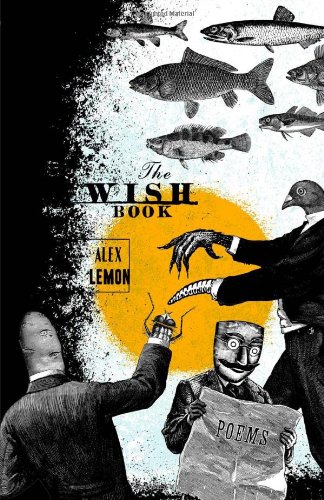The Wish Book
I was drawn to reading Alex Lemon’s The Wish Book partly from the surreal quality of its cover which features fish floating over a well-dressed bird-headed character while a mustached man reads a newspaper of poems, and a dapper potato-headed figure of many eyes lifts the arm of his suit where a large insect pokes free. Yet there are many contemporary poets who seem to draw surreal dream-like worlds on the page; that alone isn’t enough to make a book stand out for me. I was drawn to reading Alex Lemon’s The Wish Book partly from the surreal quality of its cover which features fish floating over a well-dressed bird-headed character while a mustached man reads a newspaper of poems, and a dapper potato-headed figure of many eyes lifts the arm of his suit where a large insect pokes free. Yet there are many contemporary poets who seem to draw surreal dream-like worlds on the page; that alone isn’t enough to make a book stand out for me. The thing this poet is doing in poem after poem, besides nodding at life’s strangeness, is looking intensely at the mystery of life and death, shaking up this mystery like it’s a snow globe that might reveal a new scene (or shake up the same old scene) with each shake.
The voice at the center of The Wish Book speaks with directness about the wish to be alive to one’s living, to not miss the fleeting now that keeps moving. One way Lemon captures the now-ness of the time he’s writing is by mixing references and language from pop culture (such as “The Pleasure Dome” “Our dreams will come // True & life will be Beyoncé’s thighs”) with the diction and stylistic qualities of ‘old style’ poetry (which appears in the plaintive “O perfect / Beasts. O raunchy // Goodness” in “Pure Missing”). In addition to interspersing a traditional, sometimes very concise and line-bound poetic language with a swig of casual currency, there is an emotional range in the collection from frustration to resignation to anxiety to wonder. In “I Knew You Before You Were,” Lemon writes:
[. . .] there’s a bottomless immensity
Beneath my feet & what a sacrifice
It is each day just to get by, this alchemy,
This fevered life: illness & love, [. . .]
At the end of the poem, the urgent struggle of life and the “immensity” of death hold a kind of balance in the narrator’s awareness—something he open-heartedly wants to share:
The street- so quiet. So hushed I can
Hardly breathe. Thousands of livesAre piled into all this dirt we walk
On & I’m waiting, saving it all for you.
This is Alex Lemon’s fourth book of poetry (and he is only in his mid-thirties). He also has written a memoir called Happy, based on his years recovering emotionally and physically from multiple strokes and brain surgery in his twenties. I had not read his work previously, so learning a little about his background made it clear that his frequent engagement with life’s strange possibilities—such as the potential for illness or death right around any corner—are not abstract poetizing for this author. A long poem titled “Real-Live Bleeding” in the middle of The Wish Book has a cascade of imagery and is narrated by someone who sounds like a carnival huckster, inviting us all in, including “You: swollen with this illness / Called being alive-” There is a haunted, fragmented quality to life in that eighteen-page poem which is reflected in the style it is written.
I think Lemon’s strength in this collection is in a form he chooses more frequently: one or two page poems of tightly coiled couplets or stanzas that contain an almost frenetic play of language and imagery. One of my favorites that do this in the collection is “They’ll Be Passing Out Lifejackets Soon.” Yes, there is “All this illness & the busted-up / Peek-a-boo machine whispering we’re all / Going to die-”; but, at the same time, there is a chance for relief—and even joy—as the poem opens with the narrator enthusing, “It’s so good to finally see / You shaking / Your moneymaker.” This narrator admits there’s a “wilding terror” out there in the world (or in a person) yet wants to “Sting everyone / With kisses, goddamn it- we’re still / alive!” And if given a chance to join a dance party for the night, Lemon writes: “Just work it, crush / Tonight like a joy-god and hello-hello, / The candy jar opens.” Next to that line in my paperback copy, I have written the word ‘yum.’
As I read through The Wish Book, I was reminded of a quote that wowed me when I read it some years ago on the book jacket of Jorie Graham’s The Dream of the Unified Field. Calvin Benedict wrote of Graham in The Threepenny Review that “She may write nearer the heart of ontological trauma (the shock of there being a world at all, the further shock of its passing) than any poet since Rilke . . . ” That shock is real and reverberating throughout Alex Lemon’s work, too. His imagery contains pinball machines, hot dogs, and a cat in Saran Wrap, yet in the eponymous poem which ends The Wish Book: “Pity those that die the moon sings.”





